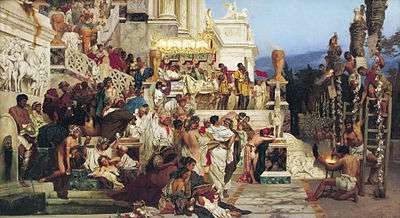Nero's Torches
 | |
| Artist | Henryk Siemiradzki |
|---|---|
| Year | 1876 |
| Medium | Oil on canvas |
| Dimensions | 385 cm × 705 cm (152 in × 278 in) |
| Location | National Museum, Kraków |
Nero's Torches (Polish: Pochodnie Nerona) is an 1876 painting by the Polish artist Henryk Siemiradzki. It is also known as Candlesticks of Christianity (Świeczniki chrześcijaństwa). It depicts a group of early Christian martyrs who are about to be burned alive as the alleged perpetrators of the Great Fire of Rome, during the reign of emperor Nero in 64 AD. People from many different social spheres, including the emperor himself, are present to watch the burning, which takes place in front of the Domus Aurea. The motif is based on the descriptions by Suetonius and Tacitus.[1]
Reception
The painting was first exhibited in 1876 at the Accademia di San Luca in Rome. It went on to tour Europe with stops in Vienna, Munich, Prague, Lviv, Berlin, Saint Petersburg, Poznań, Paris and London. It was met with critical acclaim by masters of academic art such as Hans Makart and Lawrence Alma-Tadema.[2] It has been the target of criticism over Siemiradzki's handling of exterior human beauty by painter and controversial art theoretician Stanisław Witkiewicz opposed to historical realism in general, and the monumental art of Jan Matejko in particular.[3]
Siemiradzki donated his Nero's Torches to the recently initiated National Museum in Kraków in 1879 during Józef Ignacy Kraszewski’s anniversary celebrations. With his grant, Siemiradzki inaugurated the national collection.[1] The painting is on display at the Siemiradzki Room of the Sukiennice Museum Gallery of 19th-Century Polish Art, housed at the Renaissance Sukiennice Hall in Main Square, Kraków (listed as UNESCO World Heritage Site since 1978).[4][5][6]
Reception
| Wikimedia Commons has media related to Nero's torches by Henryk Siemiradzki. |
- 1 2 Budzałek, Anna. "Painting Nero's Torches by Henryk Siemiradzki". Wirtualne Muzea Małopolski. Retrieved 2016-05-04.
- ↑ Micke-Broniarek, Ewa (December 2004). "Henryk Siemiradzki". Culture.pl. Retrieved 2016-05-04.
- ↑ Kossowska, Irena (April 2006). "Stanisław Witkiewicz, writer". Culture.pl. Translated by Tadeusz Z. Wolański. Retrieved 2016-05-04.
He waged a war against the then fashionable historical painting, with Matejko at the forefront.
- ↑ National Museum in Krakow (2009). "Sala Siemiradzkiego: Academic art". Gallery of Polish 19th century art in the Sukiennice (in Polish). Official website. Archived from the original on October 31, 2012. Retrieved May 5, 2016 – via Internet Archive.
- ↑ ""Hołd pruski" Jana Matejki wrócił do Sukiennic". Wiadomości z Krakowa (in Polish). Gazeta Krakow, Agora.pl. 2012-01-23. Archived from the original on February 29, 2012. Retrieved May 5, 2016 – via Internet Archive.
- ↑ "History of the Gallery in the Sukiennice". About the museum (in Polish). National Museum in Krakow. 2009. Archived from the original on November 13, 2012. Retrieved May 5, 2016 – via Internet Archive.